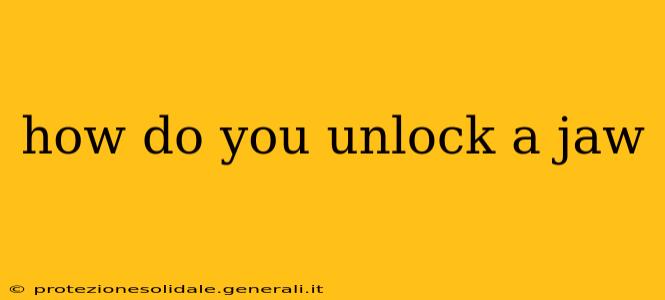A "locked jaw" isn't usually about a literal lock, but rather a dysfunction in the temporomandibular joint (TMJ), the hinge connecting your jaw to your skull. This can manifest as a jaw that feels stiff, painful, or unable to open or close fully. True jaw dislocation, where the jawbone pops out of its socket, is a separate but related issue. Understanding the difference is crucial to finding the right solution.
What Causes a "Locked Jaw" Feeling?
Many factors can contribute to the sensation of a locked jaw or difficulty opening your mouth. These include:
- Temporomandibular Joint Disorders (TMJ Disorders): This is the most common cause. TMJ disorders encompass a range of conditions affecting the TMJ, including inflammation, arthritis, and disc displacement. Symptoms can range from mild discomfort to severe pain and limited jaw movement.
- Muscle Spasms: Stress, clenching, or grinding your teeth (bruxism) can cause the muscles surrounding the jaw to spasm, restricting movement and causing pain.
- Injury: A direct blow to the jaw, a fall, or other trauma can dislocate the jaw or damage the surrounding muscles and ligaments.
- Arthritis: Osteoarthritis or rheumatoid arthritis can affect the TMJ, leading to pain, stiffness, and limited movement.
- Infections: Infections in the jaw or surrounding areas can cause inflammation and restrict jaw movement.
What is a Dislocated Jaw?
A dislocated jaw occurs when the jawbone slips out of its socket in the TMJ. This usually happens due to a sudden, forceful opening of the mouth, such as from yawning excessively, laughing widely, or during a physical injury. The symptoms are usually dramatic and include:
- Inability to close your mouth: This is the most prominent sign.
- Severe pain and tenderness: The affected area will be quite painful to the touch.
- Misalignment of the jaw: Your jaw might appear shifted to one side.
- Difficulty speaking or swallowing: The limited movement can make eating and talking difficult.
How to Treat a "Locked Jaw" Sensation (TMJ Disorders)
Treatment for a "locked jaw" feeling due to TMJ disorders typically focuses on managing pain and improving jaw function. Options include:
- Over-the-counter pain relievers: Ibuprofen or naproxen can help reduce pain and inflammation.
- Heat or cold packs: Applying heat or cold to the affected area can provide temporary relief.
- Soft foods: Eating soft foods reduces strain on the jaw.
- Mouth guards: These can help prevent teeth grinding and clenching, particularly at night.
- Physical therapy: Exercises to improve jaw mobility and strengthen surrounding muscles.
- Medications: In some cases, doctors may prescribe muscle relaxants, anti-inflammatory drugs, or other medications.
How to Treat a Dislocated Jaw
A dislocated jaw requires immediate medical attention. Do not attempt to self-treat a dislocated jaw. A medical professional can gently manipulate the jawbone back into place, a procedure known as reduction. After reduction, you may need to wear a splint or bandage to stabilize the jaw while it heals. Pain relievers and rest are usually recommended.
What are the Long-Term Effects of a Locked Jaw?
The long-term effects depend on the underlying cause. Untreated TMJ disorders can lead to chronic pain, limited jaw movement, and even difficulty eating. If a dislocated jaw isn't properly treated, it could lead to recurring dislocations or persistent pain. Early diagnosis and treatment are crucial for optimal outcomes.
How Can I Prevent Jaw Problems?
Practicing good oral hygiene, managing stress, avoiding excessive yawning or chewing gum, and maintaining good posture can help prevent jaw problems. Regular dental checkups are also important for detecting and treating any underlying dental issues that may contribute to TMJ disorders.
This information is for general knowledge and does not constitute medical advice. Always consult a healthcare professional for diagnosis and treatment of any jaw problems.
